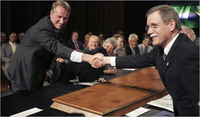$14 Billion Auto Aid Package Dies After UAW Autoworkers Refuse GOP Demands for Swift Wage Cuts
 "Birds of a feather? - Ron Gettelfinger, right, the auto workers’ president, and Rick Wagoner, the G.M. chairman, both seek to avert a strike in 2007 |
WASHINGTON December 12, 2008; The AP reported that a $14 billion emergency bailout for U.S. automakers collapsed in the Senate late last night after the United Auto Workers refused to accede to Republican demands for swift wage cuts.
Senate Majority Leader Harry Reid, a Nevada Democrat, said he was "terribly disappointed" about the demise of an emerging bipartisan deal to rescue Detroit's Big Three.
He spoke shortly after Republicans left a closed-door meeting at which they balked at giving the automakers federal aid unless their powerful union agreed to slash wages next year to bring them into line with those of Japanese car makers.
Hourly wages for UAW workers at General Motors factories are about equal to those paid by Toyota Motor Corp. at its older U.S. factories, according to the companies. GM says the average UAW laborer makes $29.78 per hour, while Toyota says it pays about $30 per hour. But the unionized factories have far higher benefit costs.
Republican Sen. George V. Voinovich of Ohio, a strong bailout supporter, said the UAW was willing to make the cuts - but not until 2011.
The Senate was conducting a test vote on the measure last night, but it was just a formality. The bill was virtually certain to fail to reach the 60-vote threshold it would need to clear to advance.
Reid called the bill's collapse "a loss for the country," adding, "I dread looking at Wall Street tomorrow. It's not going to be a pleasant sight."
The implosion followed an unprecedented marathon set of talks at the Capitol among labor, the auto industry and lawmakers who bargained into the night in efforts to salvage the auto bailout at a time of soaring job losses and widespread economic turmoil.
"In the midst of already deep and troubling economic times, we are about to add to that by walking away," said Sen. Christopher J. Dodd, the Connecticut Democrat and banking committee chairman who led negotiations on the package.
Sen. Bob Corker of Tennessee, the GOP point man in the talks, said the two sides had been tantalizingly close to a deal, but the UAW's refusal to agree wage concessions by a specific date in 2009 kept them apart.
The autoworkers' contract does not expire until 2011.
"We were about three words away from a deal," said Corker. "We solved everything substantively and about three words keep us from reaching a conclusion."
The stunning breakdown was reminiscent of the defeat of the $700 billion Wall Street bailout in the House, which sent the Dow tumbling and lawmakers back to the drawing board to draft a new agreement to rescue financial institutions and halt a broader economic meltdown. That measure ultimately passed and was signed by President George W. Bush.
It was not immediately clear, however, how the auto aid measure might be resurrected.
Congressional Republicans revolted against a version that the Bush White House negotiated with congressional Democrats and the House passed on Wednesday.


